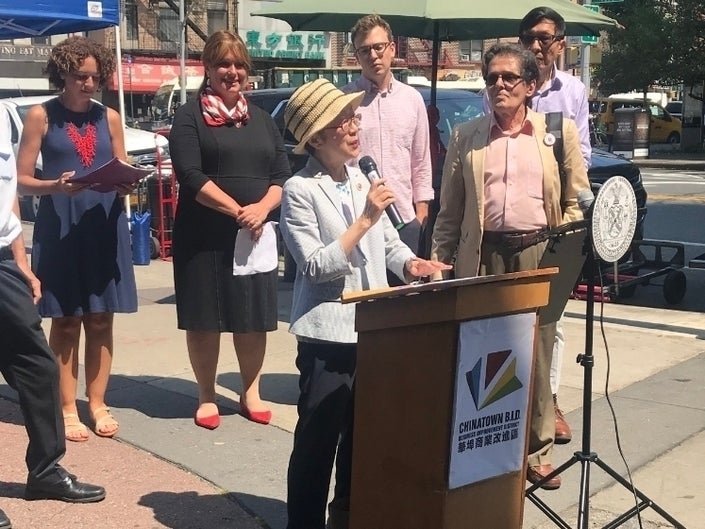
Two groups are working together to inform small business owners in Chinatown about how to make their storefronts ADA-compliant.
CHINATOWN, NY — A spate of lawsuits are targeting Chinatown business owners confused about how to be accessible to people with disabilities, according to neighborhood leaders.
Filings claiming businesses are failing to comply with the Americans With Disabilities Act have shot up by more than four times between 2013 and 2017 in New York, with the lawsuits designed to win settlements for lawyers rather than fix the issues, according to a report. Chinatown Partnership Business Improvement District and the non-profit disability rights group Art Beyond Sight are aiming to stave off the lawsuits in Chinatown with a new outreach program.
The two groups are working together on an outreach program to help teach business owners — many of them with mom and pop stores — about their requirements under the law and how to meet them.
"If you're opening a restaurant for food service, they certainly teach you the temperature the water's got to be," Edith Prentiss, a longtime disability rights activist, said.
"It's really important that businesspeople have this information.The city needs to provide that information either directly or through contracting to community programs."
The groups say many of the legal complaints result in cash settlements and don't end in businesses fixing the accessibility issues.
"Especially in Chinatown, it's very difficult to comply," said Stephen Cheung, of D.H. Realty & Management.
A report last year said many of the lawsuits target website accessibility. Some lawmakers in New York have suggested measures to control predatory filings.
The Chinatown BID's president, Wellington Chen, said exactly how many Chinatown businesses are being sued is difficult to say because owners are pressured to sign non-disclosure agreements when settling.
Chen said tenement buildings that are more than a century old and narrow sidewalks make it difficult to comply with the 1990 law, especially in a neighborhood with a plethora of immigrant-owned businesses where there may also be language challenges.
"It becomes very hard to be fully informed and aware of the rules and regulations," Chen said. "Ultimately the tragedy right now is that all the money is going to the pockets of these lawyers and not the ADA community."
For the head of Art Beyond Sight Elisabeth Axel, "It's about communication," she said. "Business Committed to Access and Inclusion is a purely educative and action-based initiative."
Councilmember Margaret Chin funded Art Beyond Sight for the outreach project in Chinatown with $5,000 earmarked in this year's City Council budget.
"It is our hope that by providing the right resources, these entrepreneurs, many of them immigrants, can avoid the type of lawsuits which can ruin the "mom and pop" establishments that make New York City unique," Chin, who represents Chinatown, said.
"Our ultimate goal is to make neighborhoods like Chinatown welcoming to all visitors."
